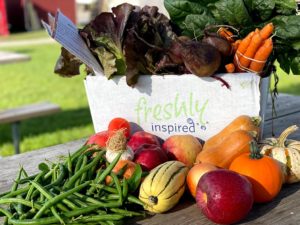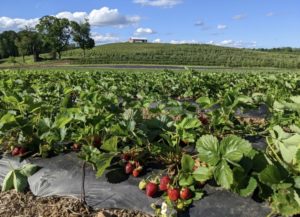Roots of a Healthy Lifestyle
Roots of a Healthy Lifestyle
Community Supported Agriculture (CSA) is a way of connecting families to farmers and increasing local food accessibility. Although there are disparities as to when the first CSA was developed, some believe the model was adapted from a 1920’s European philosopher, while others believe it may have been developed in the 1970s either in Europe or… Read More »

Dr. Booker T. Whatley was an African American horticulturist and an agricultural professor at Tuskegee University in Alabama. Dr. Whatley was a strong supporter of regenerative agriculture and a pioneer of inventive solutions for farmers with limited resources. Dr. Whatley created “clientele membership clubs” which can be seen as the beginning of the CSA (Community Supported Agriculture) model. This model empowers the farmer to seek the support of the local community to purchase a share of the farm, thereby assisting the farm efforts all year long, rather than generating income just at harvest time.
There is much a farm has to do before the produce is ready for sale and this model provides a way for small farmers to have a steady income to continue necessary operations all year long including buying seed, planting crops and maintaining equipment, and investing in technology. This CSA model is also believed to have sparked the eat local food movement which is so prevalent and important today.
Dr. Whatley’s subscription buyer’s club offered smaller farmers an opportunity to market their goods directly to consumers. This allowed them to achieve success with a diversity of crops rather than competing with larger farmers and the monoculture-type farming going on at the time. This “smaller and smarter” strategy devised by Dr. Whatley encouraged smaller farms to grow higher-value crops and sell them directly to consumers who have an interest in making connections with food and how it is farmed. Learn more about Dr. Whatley on our blog written about this by clicking here.
Today’s CSA consists of a weekly box of farm fresh produce delivered or available for pickup. The box represents fruits and vegetables that are in season on the farm which is the eating-in-season lifestyle. Eating in season provides your body with all the nutrients along with vitamins and minerals it needs at that period, as mother nature intended. Eating seasonally not only creates healthy meals, but it also helps keep the environment healthy by reducing the need for transporting goods from farther away places and climates. We on the farm have always believed in the practice of eating in season for its numerous benefits including; a healthier lifestyle, and reducing your carbon footprint, and because we’re farmers and live close to, and are in touch with the land.
Eating in season lifestyle enhances your body with foods and nutrition required to thrive in that season, affords better taste & flavor from consuming locally grown food that has been picked ripe in the fields, and reduces your carbon footprint as foods are consumed locally where they are grown and not transported great distances, all while providing more harmonious living with nature. Learn more about eating in season on our blog written about this by clicking here.
The CSA model has evolved to adapt to an ever more discerning consumer offering fruit in addition to vegetables, creating an extended
Dr. Whatley also researched the benefits of growing small fruit production as a way of making income for low-acreage farmers rather than monoculture farming of cotton or corn. This support and interest in the success of small farmers paved the way for some of the fundamentals of farming today. His research on sweet potatoes, small fruits, and honeybees is another example of his understanding of small farms and what they need to be successful which he dedicated his life’s work to achieving. We honor and thank Dr. Whatley and celebrate black history month as we pay homage to Dr. Whatley for his dedication to changing modern agriculture for us today.
Alstede Farms is proud to connect families with local foods and nourish families for over forty years. You can now enroll in a CSA (Community Supported Agriculture) membership to conveniently receive a weekly box of farm fresh produce beginning this April at several locations, including Alstede Farms’ newest location, Alstede Fresh at Lindeken Farms, in Jefferson. You can learn more about achieving a healthy lifestyle by enrolling in a CSA today by clicking here.







